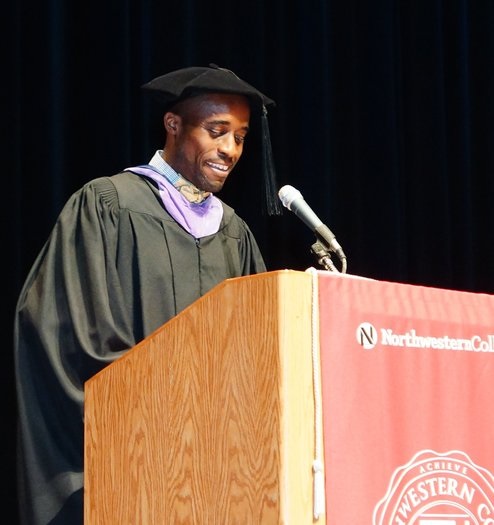The press releases for the Northwestern College 2014 Commencement finally went live yesterday. And I wanted to take a moment to share that here with those who’ve been following the developments leading up to it.
Here’s a portion of what was posted in the Chicago Tribune’s local editions.
 [Bridgeview, Chicago-Jefferson Park & Rosemont, IL] Northwestern College President Lawrence Schumacher announced that 270 students were awarded certificates and degrees at the College’s 110th Commencement Ceremony held on Friday, June 13 at the Arie Crown Theater at McCormick Place in Chicago. Graduates completed their studies at the College’s two Illinois campuses, including Bridgeview and Chicago-Jefferson Park, as well as on-line.
[Bridgeview, Chicago-Jefferson Park & Rosemont, IL] Northwestern College President Lawrence Schumacher announced that 270 students were awarded certificates and degrees at the College’s 110th Commencement Ceremony held on Friday, June 13 at the Arie Crown Theater at McCormick Place in Chicago. Graduates completed their studies at the College’s two Illinois campuses, including Bridgeview and Chicago-Jefferson Park, as well as on-line.
The largest group of graduates stemmed from the College’s School of Health Sciences, including the Programs of Health Information Technology, Massage Therapy, Coding, Medical Assisting and Radiologic Technology. The bulk of the remaining graduates were from the Schools of Commerce and Technology as well as Legal Studies. These Schools yielded graduates from the Programs of Business Administration, Executive Accounting, and Human Resources Management (Commerce) and Criminal Justice and Paralegal (Legal Studies). Finally, the College saw its third class of Nursing students graduate in 2014.
Northwestern College was honored to feature HEROmanity Project Executive Director Buihe Madu as its Keynote Speaker, the first such address of his career. Madu is also an author, speaker, and social enterprise marketing consultant. While he is currently a resident of Chicago, Madu is a New York City (Spanish Harlem) native and first generation immigrant of Nigerian parents who came to the US in the 1970’s. He connected with the graduates by describing the conflicts he had growing up, trying to be true to his Nigerian heritage to keep his parents and family happy, while also trying to fit in at school and adapt to the pressure of trying to stay “cool” with your friends. But much of his speech revolved around the turning point in his life when he was faced with the mortality of his father and the heart and kidney transplant his father was granted as a result of the misfortune of a 16 year old Colombian boy. Madu described how fate and destiny touched him as he used his limited Spanish (learned growing up in Spanish Harlem) to interpret for his father as he hugged the Colombian father who had donated his son’s organs so that he could live.
Madu urged the graduates to live lives filled with bold dares, advising that their academic journey may have prepared them for careers, but that it wouldn’t insulate them from real world breakdowns as they went through life. There were two things that would assist them in meeting life’s challenges and losses he advised: “the heart of a hero and the soul of your humanity – the part of you with a story to tell – your HEROmanity.” In urging them to live boldly and daringly, he provided them a little advice. “Make the difference you make in your career the treasure. Use your career as the canvas to tell your story, to live your destiny and share your art. Place your heart there and you’ll never be lost at what to do next.” Read the rest HERE
*You May Download Your Complimentary Copy of HEROmanity: 24 Hours to a HEROic Life Below.
About The HEROmanity Project:
The HEROmanity Project is devoted to empowering social enterprises and entrepreneurs market their artistic expressions in business and projects through social media. For more information visit http://www.HEROmanity.org
.


